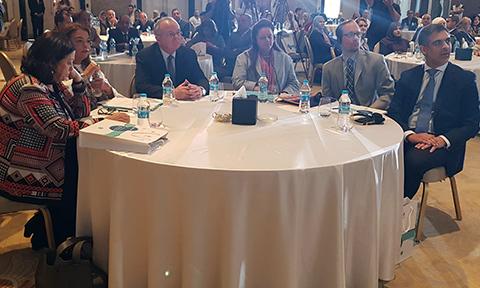

Minister of Labor, Samir Murad, stressed that the by-law on flexible work and its related instructions were the culmination of joint efforts by the national committee formed to look into the implementation of flexible work arrangements to enhance the participation of women in the labor market. The committee was chaired by the minister of labor and comprises representatives of strategic partners.
Speaking at the ceremony held to release the findings of the investigative study on flexible working models carried out by the Ministry of Labor in cooperation with the Higher Population Council and USAID Tawasol Project (J-CAP) through SIGI Jordan, Murad noted that a royal decree was issued endorsing a cabinet decision on flexible work regulations of 2017 as Jordan and the rest of the world celebrated International Women’s Day last year. The by-law serves primarily as a milestone for working women.
Murad said that the study is an output of the cooperation agreement signed between USAID and the Higher Population Council after the issuance of the flexible work instructions of 2018 pursuant to article 13 of the Flexible Work Regulations No.22 of 2017 to support and implement the instructions on flexible work and promote partnerships between the ministry and stakeholders to boost women’s participation in the labor market by ensuring proper implementation of the by-law and utilization of the demographic dividend to achieve common economic and social goals.
The Minister of Labor said that His Majesty King Abdullah II stresses that “Women, proven competent in all fields, must take their rightful place in society and the labor market. The rate of women’s participation is still unsatisfactory, a matter which constitutes a major obstacle in our development process that we have to overcome”.
Murad added that the government is keen on boosting the participation of women in various sectors to reinforce equity and equal opportunity and enhance national economy. He also said that the government has developed an action program for increasing the participation of women in the labor market by supporting the employment of women, which is a successful measure to combat poverty and unemployment.
Murad underlined the importance of the findings and recommendations of this study, which proved that the implementation of flexible work arrangements on a wide-scale increases the economic participation of women, limits their early withdrawal from the labor market and would not decrease productivity levels in organizations but would have a positive impact on businesses. Murad called on the private sector to adopt the by-law and its instructions to directly increase women’s participation in the labor market and attract competent Jordanian male and female professionals.
HPC secretary general, Dr. Abla Amawi, said that to support the realization and investment in the demographic dividend, which is expected to reach its peak in 2040, HPC has been working on key policies including the application of flexible work arrangements in various institutions to create a suitable environment that increases the participation of women in the economy and facilitates the achievement of economic and social goals to enhance the welfare of members of society.
Amawi said that since conducting a study in 2015 on the withdrawal of women from the Jordanian labor market based on Social Security Corporation’s data, HPC has been mindful of the need for flexible work arrangements and indicated that as a key recommendation in the policy brief on “Expanding untraditional work patterns”. She also noted the importance of enhancing the role of national institutions and companies in supporting the participation of women in the labor market and introducing flexible work patterns especially as the results of the study showed that 95% of major companies and institutions which has a staff of more than 50 persons and applies flexible work arrangements have demonstrated positive impacts on their work and that 70% of these institutions have indicated an increase in the productivity of male and female employees, while 60% showed that the application of flexible work arrangements has increased the employment of women and continuation of their work, and all companies and institutions agreed that male and female beneficiaries of flexible work arrangements have higher job satisfaction rates.
On the other hand, USAID acting mission director in Jordan, Nancy Eslick, said that the various forms of flexible work arrangements important tools that take into account family conditions and help both males and females to successfully balance family and work when entering or staying in the workforce.
The results of the study revealed that out of every five companies, institutions and entities (22%) across 15 sectors apply one or more forms of flexible work arrangements. 85% of these companies and institutions were Jordanian and the majority of which were based in the central region.
Moreover, 75% of companies, institutions and entities that apply flexible work arrangements are aware of the 2017 By-law on Flexible Work, whereas 35% have documented policies and procedures on flexible work, and in 55% of these companies both male and female employees benefit from flexible work arrangements, and in 45% only female employees do.
The study showed that the most common form of flexible work is intensive work weeks with fewer working days.







